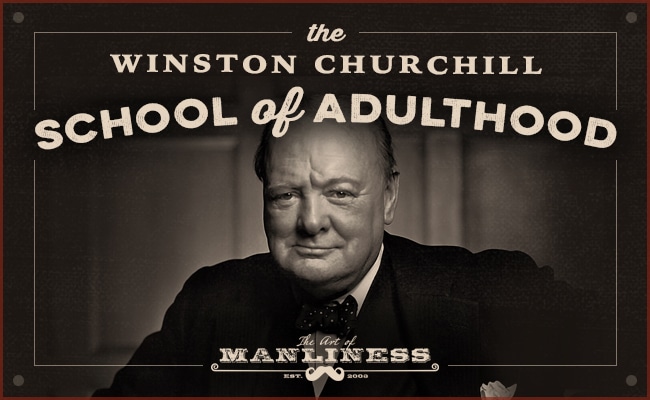
As we discussed at the very beginning of this series, Churchill’s schooldays formed “the only barren and unhappy period†of his life. Bright and imaginative, he excelled in a few classes, but struggled mightily in those he found dull — which was most of them. As a consequence, he regularly failed his examinations and ended up at the very bottom of his class. The experience left him “considerably discouraged†as to his future prospects:
“Except in Fencing, in which I had won the Public School Championship, I had achieved no distinction. All my contemporaries and even younger boys seemed in every way better adapted to the conditions of our little world. They were far better both at the games and at the lessons. It is not pleasant to feel oneself so completely outclassed and left behind at the very beginning of the race.â€
The one bright spot during Churchill’s youth was his discovery of the wonder of books. After flunking Greek and Latin, he was bumped to a “remedial†course to learn “mere†English. His instructor, Robert Somervell, recognized Churchill’s potential and offered him encouragement. His mentorship ultimately helped change the course of Churchill’s life, and Winston would later profess to being greatly indebted to his old teacher.
Somervell taught his eager pupil how to analyze and structure a well-formed sentence and stoked Winston’s nascent love of reading. Churchill began to consume every biography he could find and made his way through the works of William Wordsworth, Charles Dickens, and Shakespeare; he would ultimately read all the bard’s writings and memorize much of his verse. As Manchester writes:
“Winston was being taught to teach himself. He would always be a dud in the classroom and a failure in examinations, but in his own time, on his own terms, he would become one of the most learned statesmen of the coming century.â€
An Enduring Autodidact
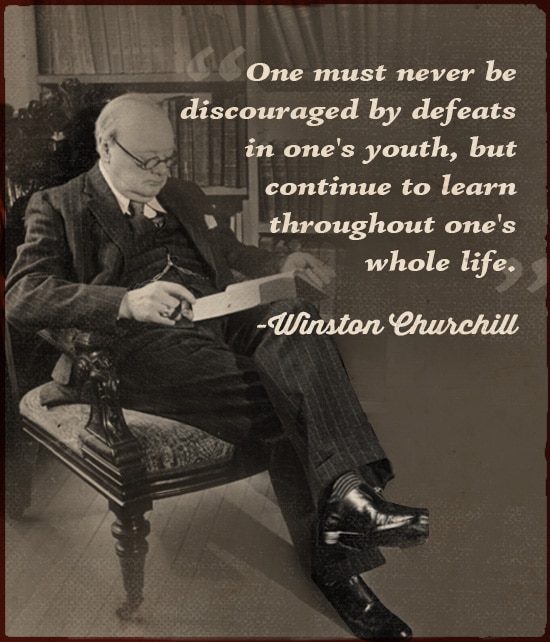
Churchill’s program of self-learning really kicked into gear when he was stationed in India as a young officer. As he neared his twenty-second birthday, “the desire for learning came upon me. I began to feel myself wanting in even the vaguest knowledge about many large spheres of thought.†To build himself a sharp, expansive, top-rate brain, Churchill “resolved to read history, philosophy, economics, and things like that,†and dedicated 4-5 hours a day to the task. He started by devouring Plato’s Republic, Edward Gibbons’ 8-volume Decline and Fall of the Roman Empire, and 12 volumes of Thomas Babington Macaulay’s historical works and essays. Churchill reported that he “rode triumphantly through†each tome and “enjoyed it all.â€
As Winston’s appetite for learning grew, he began “to read three or four books at a time to avoid tedium†and to explore a wide variety of subjects and authors. Manchester details his program of study:
“he was poring over Schopenhauer, Malthus, Darwin, Aristotle (on politics only), Henry Fawcett’s Political Economy, William Lecky’s European Morals and Rise and Influence of Rationalism, Pascal’s Provincial Letters, Adam Smith’s Wealth of Nations, Bartlett’s Familiar Quotations, Liang’s Modern Science and Modern Thought, Victor-Henri Rochefort’s Memoirs, the memoirs of the Duc de Saint Simon, and Henry Hallam’s Constitutional History. Incredibly, he asked his mother to send him all one hundred volumes of the Annual Register, the record of British public events founded by Burke. He explained that he wanted to know ‘the detailed Parliamentary history…of the last 100 years…’â€
In using these legislative texts, Churchill would first decide how he felt about an issue, and then read the record of Parliament’s debates on it, making notes in the margin as he went along and checking whether his opinion stood up to scrutiny. Through this practice, he hoped:
“to build up a scaffolding of logical and consistent views which will perhaps tend to the creation of a logical and consistent mind. Of course the Annual Register is valuable only for its facts. A good knowledge of these would arm me with a sharp sword. Macaulay, Gibbon, Plato etc must train the muscles to wield that sword to the greatest effect.â€
Churchill aimed to enter politics within a few years, and he was preparing his mind to flourish in the brutal game to come. As such, he left genres like fiction and poetry off the docket during this time. But later in life, he devoured such works and especially enjoyed the novels of Twain, Melville, and H.G. Wells, as well as the poetry of Lord Byron. He also expanded into philosophical tomes that were a little less dry and a bit more metaphysical — essays that invigorated his Romanticism from the likes of Emerson and Thoreau. Churchill’s intellectual interests were truly keen, all encompassing, and enduring; until the last decade of his life, his nightstand remained crowded with a stack of constantly refreshed books he had checked out from the library.
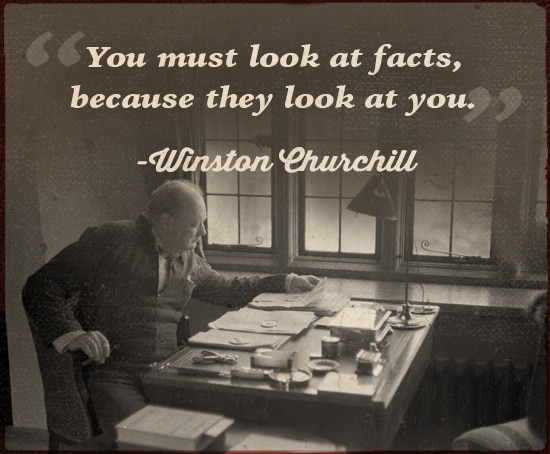
Winston’s autodidacticism broadened his mind, gave him insights into every issue and conflict native to politics specifically, and the human condition generally, and honed his capacity for critical thinking. “After a lifetime of reading,†Manchester writes, “he possessed the acumen to reduce complex intellectual systems and constructs and theories to their most basic essences.†Dr. R.V. Jones, a scientist with the RAF’s intelligence division, made a similar observation:
“He understood the essence of supreme decisions: yea or nay, right or left, advance or retreat. He knew the strengths and weaknesses of experts. He knew how easy it is for the man at the summit to receive too rosy a picture from his Intelligence advisors…Alone among politicians he valued science and technology at something approaching their true worth…and he had for seven years been warning his countrymen of the very disaster that had now befallen them. He had even, forty years before, pictured London in the position it might shortly face.â€
Churchill surrounded himself with those who also possessed quick and curious minds — those who could stimulate his thinking. He had little patience for the dull and vacuous; getting stuck in a conversation with such a person would precipitate one of his “ruthless breaksâ€! Even those with views diametrically opposed to his own fascinated him, something one of England’s most famous anti-war poets, Siegfried Sassoon, discovered when he met the country’s foremost proponent of militarism. To his surprise, Sassoon found that Churchill had actually memorized a whole volume of his pacifist poetry and was sincerely “interested in my point of view.†When an officer later said to Churchill: “I should leave that man alone if I were you. He might start writing a poem about you,†Churchill instantly replied, “I am not a bit afraid of Siegfried Sassoon. That man can think. I am afraid only of people who cannot think.â€
Action, Action This Day, Action Every Day
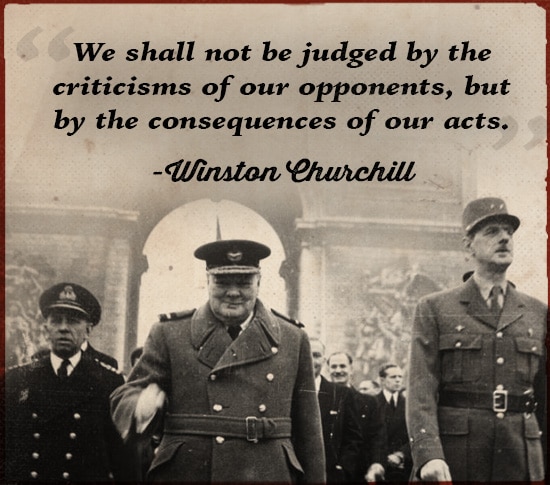
An active mind was not the only prerequisite to earning Churchill’s respect. While a capacity for intelligent thinking was certainly important, the real test was whether or not thoughts were turned into action. As Manchester puts it, “Men who have done something with their lives interest him — indeed, they are the only men who do.â€
Those who feigned contempt for public affairs, when they were really just too scared to enter the arena themselves, Churchill derided as “flaccid sea anemones of virtue who can hardly wobble an antenna in the waters of negativity.†And he had little patience for those who forwarded empty, vague, unrealistic social and political theories that were designed more to flatter the pundit’s pride and pacify the public than to actually be put into practice. As Manchester explains, Churchill “was a man of action: state the problem, find a solution, and solve the problem.â€
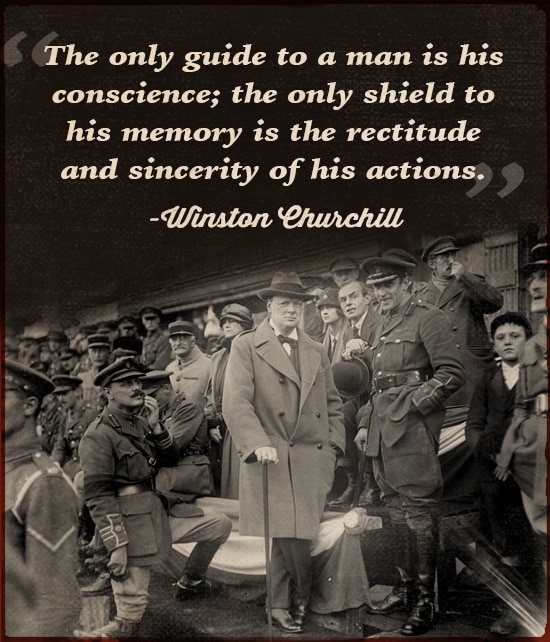
Winston not only gauged the realm of politics by the standard of action, but that of morality as well. In this he was an Aristotelian: virtue was a habit gained through constant practice. Words and thoughts — professions of belief and principle — were a good start, but could only be judged by the fruits that followed.
Action wasn’t just the rubric by which he measured others, but the standard by which he judged himself. “Every night,†he said, “I try myself by court martial to see if I have done anything effective during the day. I don’t mean just pawing the ground — anyone can go through the motions — but something really effective.â€
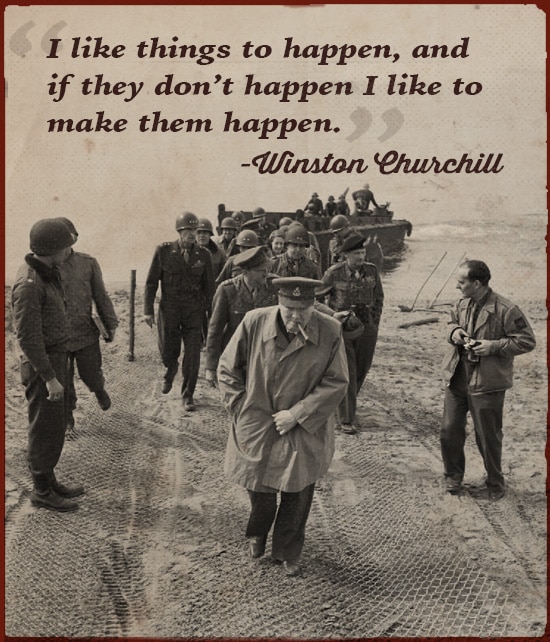
Churchill’s action-oriented philosophy is what helped turn the tide of the war. As Manchester writes, Winston understood that victory could only be won “by the vigorous exercise of his imagination and the imposition of his will by the only means he knew — action, action this day, action every day.†When Churchill first took the reins of the government, his energy absolutely electrified its headquarters and transformed an operation that had formerly been languishing and listless:
“Churchill arrived on the scene like a summer squall at a sailboat regatta. Whitehall was galvanized, and the office at No. 10 was pandemonium. Bells were ringing constantly, telephones of various colors were being installed in every nook at No. 10, and the new prime minister was attaching maroon labels demanding ‘Action This Day’ or green ones saying ‘Report in Three Days’ to an endless stream of directives that were being dictated to typists in the Cabinet Room, the P.M.’s bedroom, and even his bathroom, with replies expected within minutes. Ministers, generals, and senior civil servants appeared and departed within minutes. Working hours began early each morning and ended after midnight. ‘The pace became frantic,’ another private secretary, John Martin, recalled. ‘We realized we were at war.’â€
Churchill’s penchant for action turned the tide of his life as well, and served as the lynchpin in making it what it was. Anthony Storr, an eminent British psychiatrist, posited that the source of Churchill’s strength lay in his “inner world of make-believe;†but Winston was not content to let his dreams merely amuse him, in the way of an impotent Walter Mitty. Rather, Manchester writes, he was driven “to complete the circuit between the goings-on in his mind and the external world. Once he generated an idea, he felt compelled to actualize it.â€
Churchill created a narrative from his vivid imagination, and then steadfastly worked to bring that vision to life. The result was one of the most interesting, original, and eventful adulthoods in history.
The Winston Churchill School of Adulthood: Conclusion
While we may not be fighting the Nazis, all of us face a battle in not surrendering to a boring, unfulfilling adulthood. For the past few months Sir Winston Churchill has been our luminous guide in teaching us the key strategies on how to vanquish this common foe. We have sat in his war room and pored over his maps that trace the path to growing up well. We hope the information presented in these classes has been instructive and inspiring. But now comes the hard part — acting on the information!
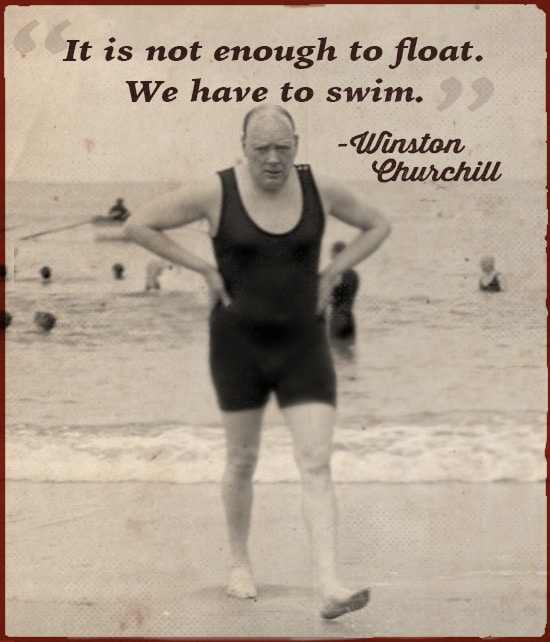
Lt. General Ian Jacob said that Churchill’s “pugnacious spirit demanded constant action. The enemy must be assailed continuously.†So it is with us: to achieve a flourishing adulthood requires being supremely proactive. You can’t wait for your ship to come in; an awesome adulthood won’t arrive on your doorstep like a package from Amazon. Grownup life is flooded with many streams of responsibilities, and if you let yourself slide into default mode, you’ll invariably be swept downstream into an existence where you aim merely to complete your day-to-day necessities, live on the very surface of things, and watch the years of your one and only shot at mortality slip by.
Lights, Camera…
Creating an awesome adulthood involves using your imagination to create a story for yourself, and then taking ceaseless action to bring that narrative to life. It’s like riding a stationary bike that powers a film projector: to create a new world — to project your chosen narrative on the screen of your life — you must pedal continuously.
Making your story worth watching, nay, inhabiting, requires conjuring up an engaging, multi-layered tale. When Churchill was young, his father wrote a letter to a relative to express his frustration with his son: “I have told you often and you would never believe me that he has little [claim] to cleverness, to knowledge or any capacity for settled work. He has great talent for show off exaggeration and make believe.†Churchill’s father meant these words as a criticism, but Winston’s penchant for make-believe would in fact become one of his greatest assets. As Manchester writes:
“Churchill had spent his entire life creating an identity from his own audacious imagination, which, as Oscar Wilde observed, was the best way to get through life without suffering through it all. Churchill had made his dream a reality; he had imagined himself into Sir Winston Leonard Spencer Churchill, the greatest statesman of the twentieth century.â€
To imagine and then bring to life your own hero’s journey, follow some of the time-worn steps of creating any great tale:
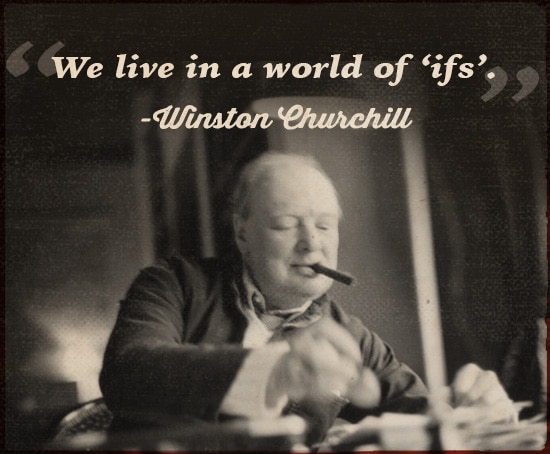
Create an outline of the plot. The story of your adulthood is going to involve a lot of revisions and changes on the fly. How you think things will unfold at the start is assuredly not how they will actually work out.
Still, you should have a rough blueprint of your life’s goals. Entering maturity without one is a recipe for getting caught in an anxious, restless drift. You need to know what you stand for and where you’re going. It will help you make big decisions and keep you progressing on the right path. Churchill knew from a young age that he wanted to enter politics and become prime minister, and he was able to move continually towards that goal over the course of forty years.
A man always has a plan, especially for something as important as his life. To create an outline for how you’d like your journey to go, follow this step-by-step guide.
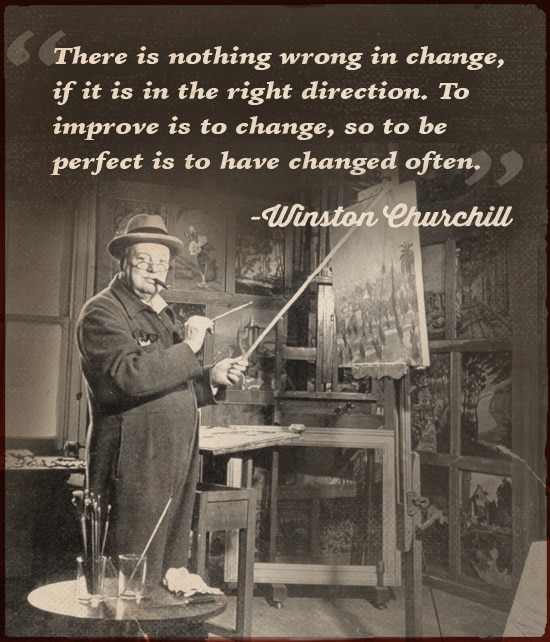
Accept the setting (and make the most of it). You may be creating the tale of a hero’s journey, but this one doesn’t take place in some fantasyland, where anything is possible. Your adulthood will be lived out in this world, in real time. The broad outlines of the setting are cemented in place.
The modern advice on creating the story of your adulthood suggests pretending this isn’t so, and remaining an eternal Peter Pan in spite of the passing years; adult responsibilities, commitments, dress, decorum, and so on are to be rejected. Yet the success of this strategy is subject to the law of diminishing returns; this is to say, just because living a certain way in your 20s made you happy, doesn’t mean it’ll be equally fulfilling in your 40s. Trying to maintain an adolescent lifestyle once you’ve left adolescence is like trying to plant seeds in the winter, because you had success planting them in the spring. To everything there is a season, and making the most of life means making the most of the one you’re currently in – not pretending you’re still in a different one. Instead of defiantly standing in the snow in your cargo shorts, come in from the cold!
Embracing the season of adulthood need not mean enduring a sterile life in an icy landscape. True, in winter the livin’ feels a little harder and working up the motivation to do stuff takes more effort. But once you set yourself up for the season and are outfitted for the weather, plenty of enjoyable activities are available — skiing, snowshoeing, tobogganing, sitting by a crackling fire, etc. Likewise, the world of adulthood is full of new activities and pleasures. Independence, marriage, children, career, and leadership can all be enormously satisfying pursuits — if you have the right attitude and mindset and decide to make the most of them.
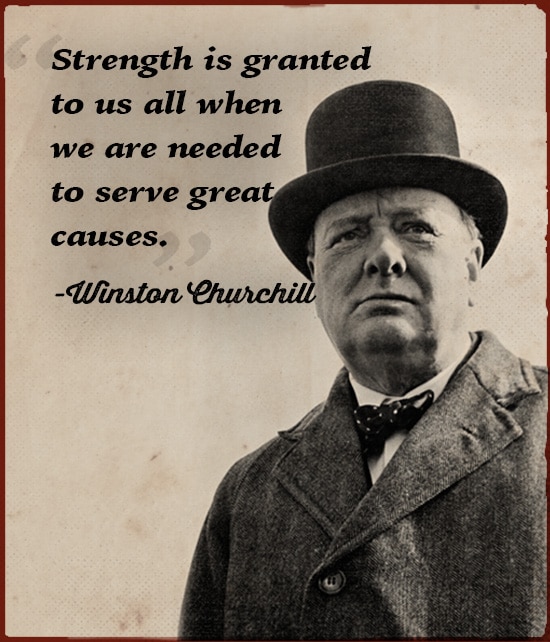
Be prepared for ups, downs, and tragic plot twists. We tend to picture Churchill as Winston-the-Triumphant, waving his trademark victory sign on V-E Day. We forget that, as Manchester puts it, his life more often resembled “the Greek legend of Sisyphus, who was condemned to toil up a steep hill pushing a huge stone which, just before he reached the top, always rolled back to the bottom.†He lost a young daughter to disease, an older one to suicide. During the 1930s he was excoriated by the press, mocked by the public, and condemned by his peers. He “lost more elections than any other British politician of his time†and didn’t achieve his lifelong goal of becoming prime minister until he was 65.
No adulthood progresses as an undeviating ascent. Obstacles appear; challenges emerge; setbacks materialize. There are seasons within seasons; some more dry, some more fertile.
We wouldn’t want it to be all smooth sailing anyhow; you can’t have the bitter without the sweet, and no man can know himself without a trial. As long as we don’t let setbacks crush us, they can form stepping stones to greater opportunities and depth of character.
To weather the storms of adulthood, we would all do well to adopt Churchill’s maxim — K.B.O.: Keep Buggering On.
Create a multi-layered storyline. The best books you’ll ever read aren’t flat, one-dimensional kid’s stuff. They’re stories with complex plots that are full of deep, complicated characters, evocative settings, unforeseen plot twists, passionate romance, gripping mystery, and rich complexity.
So when you craft the narrative of your adulthood, make it the kind of story you’d like to read by adding in these kinds of layers. In order to do that, you need a rich palette of possibilities to draw from.
To that end, crafting a magnificent adulthood doesn’t mean squashing your youthful energies and interests to fit some one-dimensional mold, but wedding them to more mature inclinations and pursuits. We’ve talked about these key, seemingly contradictory couplings throughout the series:
- Allowing room for doubt while cultivating a firm moral code
- Embracing the idea that setting a routine can actually be freeing
- Being able to see the world realistically, while living romantically
- Knowing all the facts and unflattering details of history, while still finding it inspiring
- Being able to find adventure both on the battlefield and in front of a typewriter
- Celebrating tradition, while practicing nonconformity
- Being both tough and indomitable, and sentimental and emotional
- Finding that family life can actually increase adventure rather than stifle it
- Being both nostalgic and forward-looking, while living fully in the present
- Knowing that children can both take years off your life and make you feel young again
- Finding that passion follows the beginning of a career path, rather than precedes it
- Discovering that the most effective rejuvenator can be more activity, rather than less
- Being able to be sober and serious, while always maintaining a sense of humor and fun
- Discovering that the ball and chain of marriage is anything but
- Recognizing that taking on more responsibilities can make you feel less stressed, rather than more
- Committing to lifelong learning, while cultivating consistent principles
- Being able to think clearly and deeply, while also tirelessly taking action
And that’s not even an exhaustive list!
In harnessing these “contradictory†energies, the effect becomes like a particle collider; the contact between your divergent ideas/interests/beliefs creates access to new knowledge and dimensions of existence that are closed both to those who surrender to a lifeless maturity, and those who fruitlessly attempt to remain forever young. A colleague of Churchill’s described him as having a “zigzag streak of lightning on the brainâ€; to achieve a magnificent adulthood, we all need to maintain that same kind of electricity.
Holding the energies of youth and maturity in tension is not an easy task, and that’s why most adults settle for a flat, simplistic, black and white kind of narrative. Yet the payoff is truly worth the effort. Embracing a swirl of contradictory currents won’t necessarily bring you world renown and put you at 10 Downing Street — everyone’s circumstances are different. But wherever you are, and whatever you do in life, it will create a far more fulfilling, flourishing existence than would have otherwise been possible.
In fact, perhaps the one “contradiction†most important for grownups to embrace is this: a flourishing life can take many forms, and satisfaction can be found in the most basic of pleasures. Churchill himself — renowned writer, world traveler, prime minister — declared that “all of the greatest things are simple.†Indeed, he found his highest satisfaction in good food, good drink, and good company.
Action!
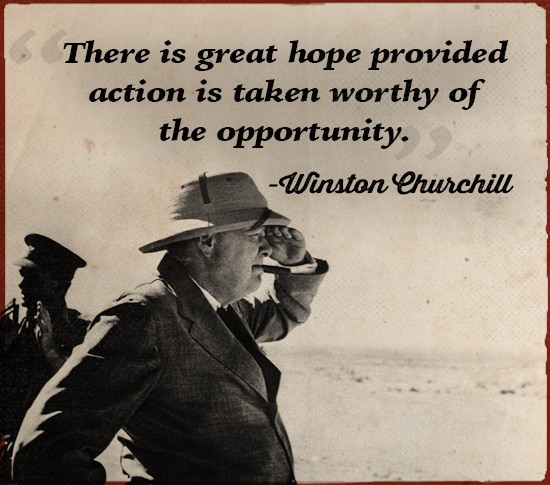
The greatest power and privilege of adulthood is having the freedom and autonomy to make of your life whatever you will. Yet while we wait two decades to come into this power, we often spend the remainder of our lives squandering it.
It’s not that we don’t know what we’d like to change about our lives — we usually do. Monthly, weekly, even daily the thought comes into our minds: “I’d really like to start/improve ____.â€
But just as soon the thought arises…our phone buzzes, the baby cries, an email pops up in the inbox. A stream of more urgent tasks pushes away the itch for something more, until it circles back and lightly taps us on the shoulder once again.
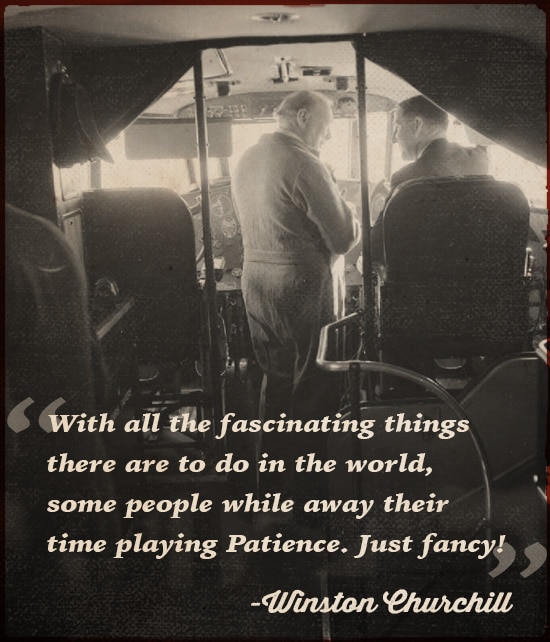
We ever resolve to finally address this persistent nudge…when we have more time. When we get a better job, when we move into a bigger home, when the kids aren’t toddlers anymore, when the kids aren’t teenagers anymore, when the kids are out of the house…
And yet the reality of adulthood is that while its phases do change, as some aspects become less time-intensive, others become more so. We’ll simply never have any more time than we do now. It is thus wise to follow the advice of the old proverb: “The best time to plant a tree is 20 years ago. The second-best time is now.â€
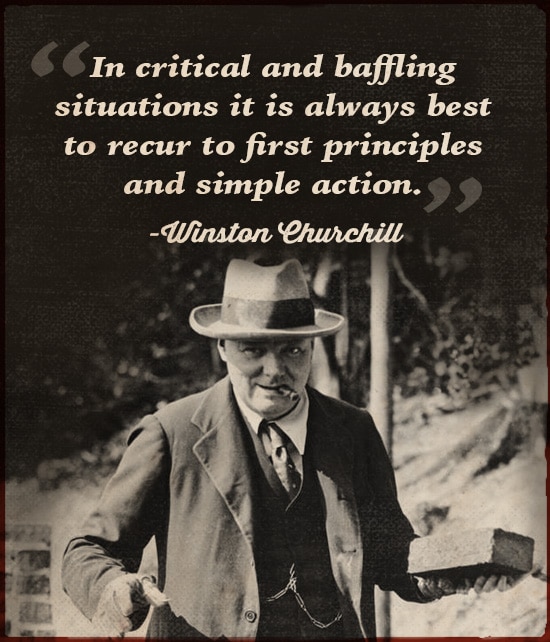
Part of what keeps us from getting going is the idea that the changes we need to make are dramatic, and thus time-intensive. But that simply isn’t the case. It’s the small things you do every single day that add up to an awesome adulthood.
So rather than trying to to attack the grownup doldrums on every front with monumental moves, pick a few areas that especially pricked your heart as you read this series, and begin doing little things each day to feed that languishing energy.
Want to improve your relationship with your wife? Write her a love letter. Aren’t married and wish you were? Ask a genuinely cool gal on a date.
Feel like you’re wasting most of your free time? Set a schedule for your evening and morning routine and follow it.
Wish you had a hobby? Pick one you’d like to pursue and spend this Saturday getting started with it.
Want to increase your reflective and intuitive powers? Take a walk in the woods today and absorb the scene with all your senses.
You’ll be amazed at the power of small, simple things to significantly alter your satisfaction with life.
In addition to implementing small changes, steadily work towards putting yourself in a position to have access to greater opportunities and the freedom to exercise the best energies of adulthood. Get out of debt; seek more autonomy at work; embrace fulfilling responsibilities; schedule your week; maintain your health. Follow Churchill’s lead in always envisioning new horizons for yourself and thoroughly enjoying the long, circuitous journey towards them.
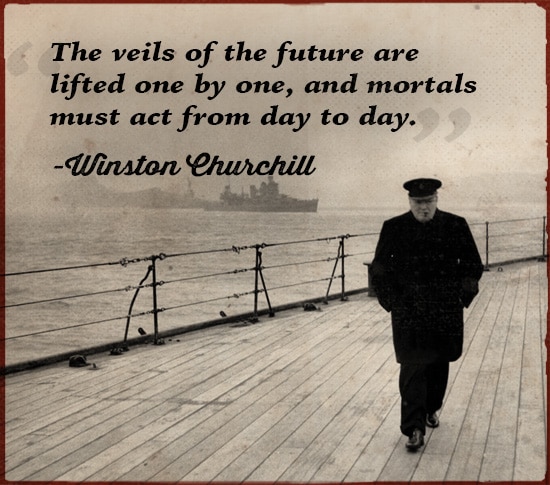
Ultimately, the most important thing to take away from this series is this: you can’t think your way into an awesome adulthood. We’ve never had so much information on every possible lifestyle choice you can make in this world. But all that information will do nothing but make you feel anxious and restless unless you act on it. Nothing good in life just happens; you have to be intentional about it. Manchester posited that Churchill’s existence and identity could be summed up as “I act, therefore I am.†The path to adulthood can be likewise described.
Take action — action this day, action every day — and you’ll be able to say, as Churchill did, that while your 20s sure were grand, “I have been happier every year since I became a man.â€
And with that the Churchill School of Adulthood comes to a close. On behalf of us, and Winston, we wish you the very best on the path to becoming a grown-up glowworm.
Class dismissed!

Read the Entire Series
The Winston Churchill School of Adulthood Is Now in Session
A Prerequisite Class on Becoming the Author of Your Own Life
Lesson #1: Develop a Mighty Moral Code
Lesson #2: Establish a Daily Routine
Lesson #3: Live Romantically
Lesson #4: Cultivate a Nostalgic Love for History
Lesson #5: Don’t Give Up Your Sense of Adventure
Lesson #6: Don’t Be Afraid to Start a Family
Lesson #7: Work Like a Slave; Command Like a King; Create Like a God
Tips on Hustling, Leadership, and Hobbies from Winston Churchill


